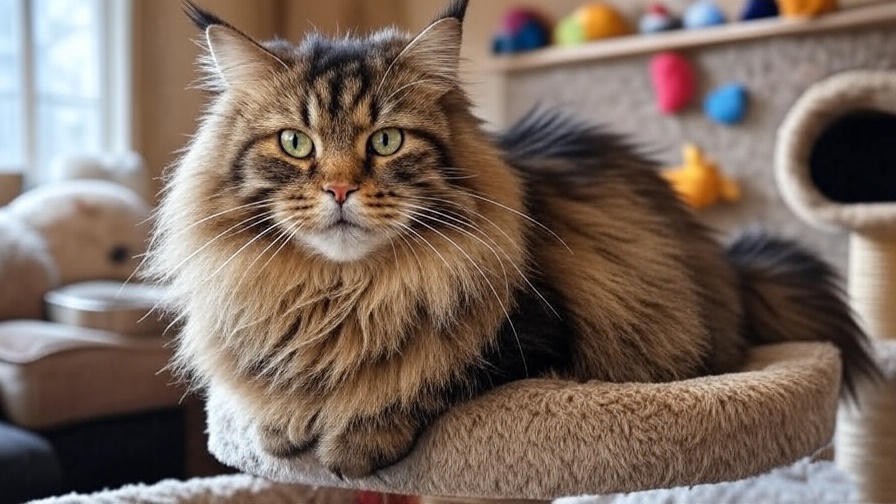
Are you thinking about bringing a Maine Coon into your home? This majestic cat breed, known for its size and friendly nature, has captured the hearts of cat lovers worldwide.
But before you make this big decision, you might wonder: Are Maine Coons hard to take care of? The answer might surprise you. You’ll discover the ins and outs of caring for these gentle giants. From their grooming needs to their playful personalities, you’ll get a clear picture of what life with a Maine Coon entails.
If you’re curious about how to keep your future feline friend happy and healthy, keep reading. Your journey to understanding Maine Coon care begins here.
Maine Coon Characteristics
Maine Coons are known for their friendly nature and impressive size. Their care needs are manageable despite their large size. Regular grooming and attention keep them content, making them suitable pets for many families.
Maine Coons are a fascinating breed, known for their unique characteristics that make them stand out among cat enthusiasts. Understanding these traits can help you decide if this gentle giant is the right fit for your home. Let’s dive into the distinctive qualities of Maine Coons, from their physical traits to their temperament and behavior.
Physical Traits
Maine Coons boast a majestic appearance with their large, muscular bodies and bushy tails. They have tufted ears and expressive eyes, which often give them a curious and wise look. Their coats are thick and water-repellent, perfect for colder climates. This means regular grooming is essential to keep their fur free of mats and tangles. The grooming routine can be a bonding experience for both of you, turning a chore into a cherished ritual. Are you ready for a cat that might weigh more than your dog? Maine Coons can grow to impressive sizes, with males reaching up to 18 pounds or more. This means you’ll need sturdy furniture to accommodate their hefty frame.
Temperament And Behavior
Maine Coons are often described as “gentle giants” due to their affectionate nature and sociable disposition. They love being around people and can be quite talkative, using soft chirps and trills to communicate. Unlike some aloof feline breeds, Maine Coons are known for their dog-like loyalty. They may follow you around the house, curious about your activities and eager to be involved. This can be delightful if you’re looking for a companion who enjoys your company. While they are playful and energetic, Maine Coons are not overly demanding. They are content with simple toys and occasional playtime. Their playful nature doesn’t mean they’re hyperactive, making them a balanced choice for families or singles alike. Have you ever wondered what it’s like to have a cat that fetches? Maine Coons can surprise you with their intelligence and ability to learn tricks, making playtime interactive and fun. Their behavior is adaptable and trainable, adding a layer of excitement to your pet ownership experience. Are these traits what you’re looking for in a pet? Maine Coons offer a blend of beauty and personality that can enrich your life, but they do require commitment and care. Are you ready to welcome this wonderful breed into your home?
Dietary Needs
Maine Coons require attention to their dietary needs, needing a balanced diet for their large size. Their nutrition involves high-protein food to maintain energy levels. Regularly monitoring their food intake helps prevent obesity and keeps them healthy.
Maine Coons are magnificent cats known for their size and playful nature, but understanding their dietary needs is crucial for their health and happiness. Proper nutrition isn’t just about feeding them; it’s about ensuring they thrive. If you’re thinking about adopting a Maine Coon, consider their unique dietary requirements to keep them healthy and energetic.
Nutritional Requirements
Maine Coons need a balanced diet with the right mix of proteins, fats, and carbohydrates. They thrive on high-protein foods, ideally from meat sources. Look for cat food with real chicken or fish as the main ingredient. Avoid fillers like corn or soy that offer little nutritional value. Maine Coons are also prone to obesity, so keep an eye on fat content. Choose foods with healthy fats like omega-3 and omega-6 fatty acids. You might wonder if supplements are necessary. Discuss this with your vet to tailor their diet, ensuring they get all essential vitamins and minerals without overdoing it.
Feeding Schedule
Timing is everything when it comes to feeding your Maine Coon. Regular meals help maintain their energy levels and prevent overeating. A consistent schedule also makes it easier for you to monitor their diet. Consider feeding them twice a day—once in the morning and once in the evening. This routine keeps their metabolism active and reduces the risk of weight gain. Adjust portion sizes according to their age and activity level. Make mealtime a routine. It can be a bonding experience, helping you detect any changes in their eating habits. Are they eating less? It could signal a health issue. Regular feeding lets you catch these signs early. In caring for your Maine Coon, are you prepared to meet their unique dietary needs? It’s a rewarding journey that ensures they remain your loving companion for years to come.
Grooming Essentials
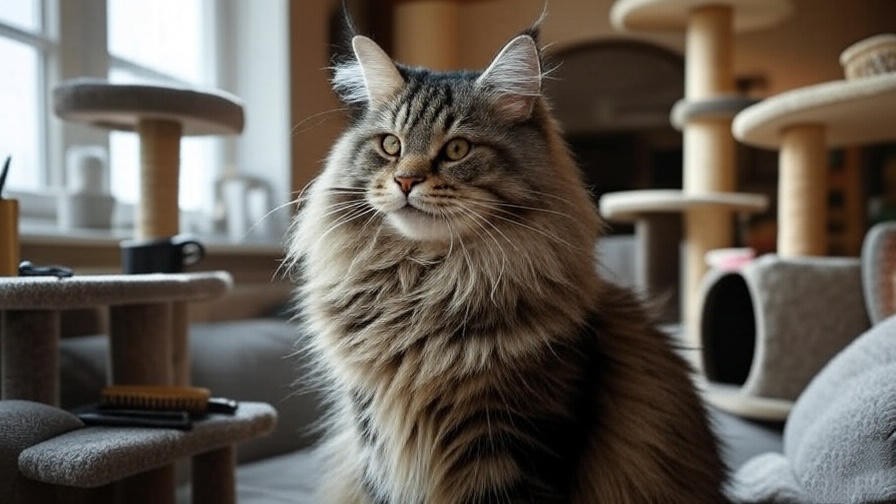
Maine Coons are known for their majestic appearance. Their grooming needs are essential for maintaining their beauty and health. Regular grooming helps keep their coat shiny and prevents health issues. Each grooming step plays a vital role in their overall care.
Coat Maintenance
The Maine Coon’s coat is thick and long. It requires regular brushing to prevent tangles. Use a wide-toothed comb for best results. Brush their coat at least twice a week. This helps remove loose fur and dirt. It also reduces shedding. Regular brushing keeps their coat looking smooth and healthy.
Nail And Ear Care
Maine Coons have strong nails. Trim them regularly to avoid overgrowth. Use pet nail clippers carefully. Check their ears weekly for dirt and wax. Clean gently with a damp cloth. Avoid inserting anything deep into the ear canal. Proper nail and ear care prevent infections and discomfort.
Health Considerations
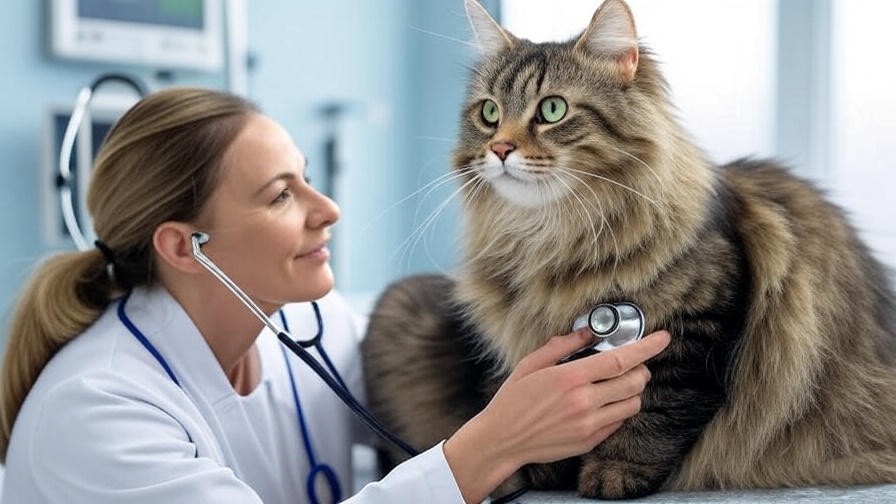
Maine Coons, with their majestic fur and gentle demeanor, are truly captivating. Despite their beauty, potential owners often worry about their care requirements. Health considerations are crucial when deciding to adopt a Maine Coon. Understanding their health needs ensures they thrive and remain happy.
Common Health Issues
Maine Coons can face specific health challenges. Hypertrophic Cardiomyopathy (HCM) is a common heart condition in this breed. It affects the heart’s ability to pump blood efficiently. Regular heart screenings can help detect this condition early. Hip Dysplasia, another concern, affects joint function. It can lead to discomfort and mobility issues. Paying attention to their movement can help in early detection. Dental problems are also prevalent. Regular dental care helps prevent these issues.
Regular Veterinary Check-ups
Routine vet visits are essential for Maine Coons. These check-ups help monitor their overall health. Vets can identify potential problems before they escalate. Annual vaccinations are crucial to protect against common feline diseases. They ensure your Maine Coon remains healthy and strong. Parasite prevention is another important aspect. Regular treatments guard against fleas, ticks, and worms. A vet can advise on the best preventative measures.
Exercise And Activity
Caring for Maine Coons involves regular exercise and engaging activities. These cats enjoy interactive play and mental stimulation. Their playful nature makes them delightful companions.
Maine Coons, with their majestic appearance and playful demeanor, require a good balance of exercise and activity to stay healthy and happy. These gentle giants are more than just couch potatoes. They thrive in environments where they can stretch their long legs and engage in stimulating activities. If you’re wondering whether Maine Coons are hard to take care of, understanding their exercise needs is key.
Playtime Needs
Maine Coons are known for their playful nature, often behaving more like kittens well into adulthood. To keep them entertained, regular playtime is crucial. Interactive toys like feather wands or laser pointers can work wonders. These toys not only satisfy their hunting instincts but also provide a great bonding opportunity for you and your furry friend. Ever tried playing hide and seek with your cat? It’s a fun way to engage them and keeps their minds sharp. Plus, it’s a great excuse for you to take a break and enjoy some light-hearted fun.
Environmental Enrichment
Creating an enriching environment for your Maine Coon can enhance their quality of life. Consider setting up vertical spaces like cat trees or shelves. They love climbing and exploring different heights. A window perch can also be a fantastic addition. Watching birds or the world outside can provide hours of entertainment. Simple changes, like rotating toys or introducing new textures, can keep their environment stimulating. Have you ever noticed how a simple cardboard box can become the ultimate playground for your Maine Coon? It’s these little things that make a big difference. So, how can you make your Maine Coon’s life more exciting today? Remember, a happy cat is an active one.
Socialization Tips
Maine Coons are friendly and easygoing, making them pleasant companions. Proper socialization helps them feel comfortable around people and pets. Regular interaction and gentle encouragement foster their sociable nature, ensuring they adapt well to various environments.
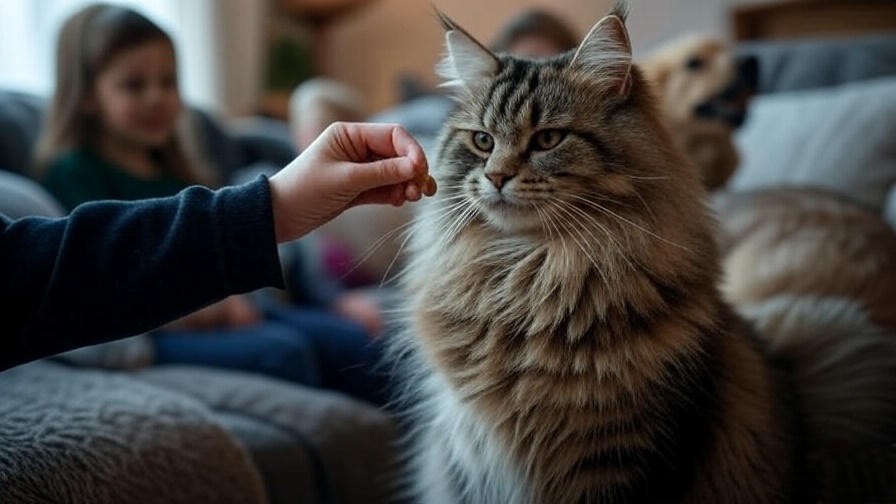
Socializing your Maine Coon cat is a rewarding journey that enhances their quality of life and strengthens your bond. These gentle giants, known for their friendly disposition, thrive on interaction and companionship. Whether you’re introducing them to humans or other pets, the right approach can make all the difference.
Interaction With Humans
Maine Coons are naturally sociable and love human company. Start by spending quality time with your furry friend every day. Engage in activities like playing with toys or simply sitting together. Talk to your cat in a calm and soothing voice. This helps them become familiar with your tone and presence. You might be surprised at how they respond, sometimes even mimicking your mood. Invite friends and family over to interact with your cat. It’s a great way for them to get used to different people. Just ensure that the interactions are gentle and positive. Have you noticed how they tend to gravitate towards the person who pays them the most attention?
Introducing To Other Pets
Maine Coons can get along well with other pets, but introductions should be gradual. Begin by allowing them to sniff each other’s scent from a distance. This can be done by swapping bedding or toys. Monitor their initial meetings closely. Keep these sessions short and sweet, gradually increasing the time as they grow more comfortable. Have you ever seen a Maine Coon trying to make friends with a dog twice its size? Create separate spaces for each pet. This gives them the option to retreat and feel secure. Over time, they may start sharing these spaces, showing you that they’ve accepted each other. By following these socialization tips, you help your Maine Coon build strong, positive relationships. These interactions enrich their lives and make them even more delightful companions.
Training And Discipline
Maine Coons, known for their friendly nature, require regular grooming due to their thick fur. Training them with patience and consistency ensures they adapt well to household rules. With proper discipline, they become loving companions, making them manageable pets.
Training and discipline are crucial aspects of raising a Maine Coon. These majestic cats, known for their gentle temperament and intelligence, require consistent guidance to thrive as well-mannered companions. It’s not just about teaching them tricks; it’s about setting boundaries and understanding their unique behavior. You might wonder, how do you effectively train such an independent spirit? Let’s dive into the specifics.
Basic Commands
Teaching basic commands to your Maine Coon can be an enjoyable experience. Start with simple commands like “sit,” “come,” or “stay.” Use treats as rewards to reinforce positive behavior. Consistency is key. Practice these commands regularly, ideally in short sessions to keep your cat engaged. Remember, patience goes a long way. Some Maine Coons pick up commands quickly, while others may take a little longer. It’s important to celebrate small victories, like when your cat finally responds to “come” after days of practice.
Handling Unwanted Behavior
Addressing unwanted behavior in Maine Coons requires a balanced approach. If your cat scratches furniture, redirect them to a scratching post. Use toys and catnip to make the post appealing. Avoid harsh discipline like yelling or physical punishment. Instead, use firm voice commands or a gentle spray of water to deter bad behavior. Consider your Maine Coon’s perspective. Are they acting out due to boredom or stress? Engaging them in interactive play can prevent issues like excessive meowing or aggression. Training and discipline are not just about correcting behavior; they’re about building a mutual understanding. How do you ensure your Maine Coon feels understood? Share your experiences and insights with us in the comments below.
Expert Advice
Maine Coons, known for their gentle nature, are generally easy to care for. They require regular grooming due to their thick fur. Providing a balanced diet and regular vet visits ensures a healthy life.
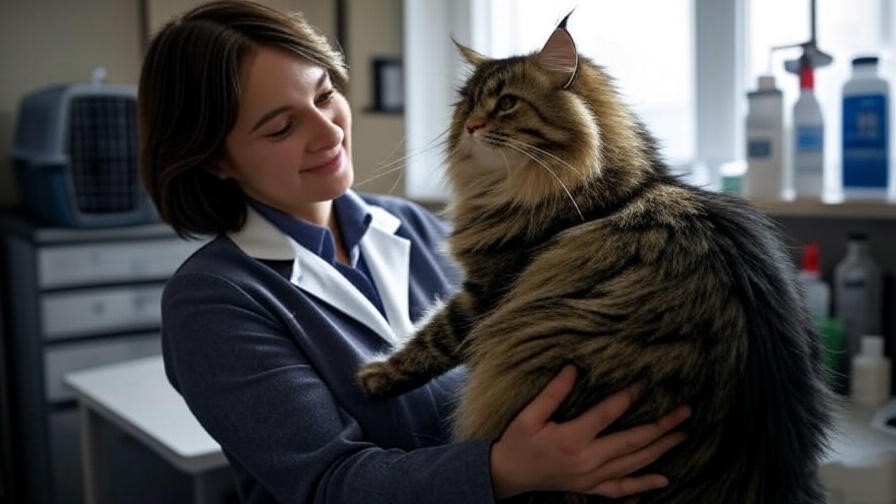
Are Maine Coons hard to take care of? This question often pops up when prospective cat owners consider adopting one of these majestic felines. With their large size and distinct personalities, it’s crucial to understand the care they require. Let’s dive into expert advice that can help you make an informed decision about welcoming a Maine Coon into your home.
Breeder Insights
Maine Coon breeders often emphasize that these cats are sociable and thrive on interaction. They are not solitary creatures. My friend adopted a Maine Coon from a reputable breeder, and she was advised to spend quality time with her cat each day. Breeders suggest regular grooming to maintain their luscious coats. Maine Coons have a dense undercoat that can mat easily if neglected. A simple routine of brushing a few times a week can prevent tangles and reduce shedding.
Veterinarian Recommendations
Veterinarians recommend a balanced diet to support the Maine Coon’s large size. High-quality cat food rich in protein can help maintain their health and energy levels. I remember visiting my vet who advised adding wet food to my cat’s diet to keep him hydrated. Regular veterinary check-ups are crucial. Maine Coons are prone to certain health conditions like hip dysplasia and heart disease. Catching these early can make a significant difference in your cat’s quality of life. Do you have the time and resources to meet these needs? If yes, a Maine Coon can be a wonderful addition to your family. With the right care, they can provide years of companionship and joy.
Frequently Asked Questions
Are Maine Coons High Maintenance Pets?
Maine Coons are relatively low maintenance compared to other long-haired breeds. They do require regular grooming due to their thick fur. Weekly brushing helps prevent matting and reduces shedding. Regular vet check-ups, a balanced diet, and exercise are essential to keep them healthy.
Overall, they are friendly and adaptable pets.
Do Maine Coons Need Special Grooming?
Yes, Maine Coons require regular grooming due to their thick, long fur. Brushing their coat at least once a week helps prevent tangles and matting. Regular grooming also reduces shedding and keeps their fur healthy. Occasional bathing and nail trimming are also recommended for maintaining their hygiene.
Are Maine Coons Suitable For Families?
Maine Coons are known for their friendly and sociable nature, making them excellent family pets. They are gentle and patient with children, and they get along well with other pets. Their playful and affectionate demeanor makes them a great addition to households looking for a loving companion.
How Much Exercise Do Maine Coons Need?
Maine Coons are active and playful cats that need regular exercise to stay healthy. Interactive play sessions with toys and climbing structures help keep them engaged. Providing space for them to explore and play is important. Daily playtime ensures they maintain a healthy weight and prevents boredom.
Conclusion
Maine Coons are friendly and loyal cats. Their care is not hard. Regular grooming helps maintain their coat. A balanced diet keeps them healthy. They enjoy playful activities and need space. Vet visits ensure they stay well. Maine Coons fit well in loving homes.
Their size may need extra attention. But their affectionate nature makes it worth it. Owners often find joy in their companionship. With the right care, they thrive. These cats make wonderful family pets.
